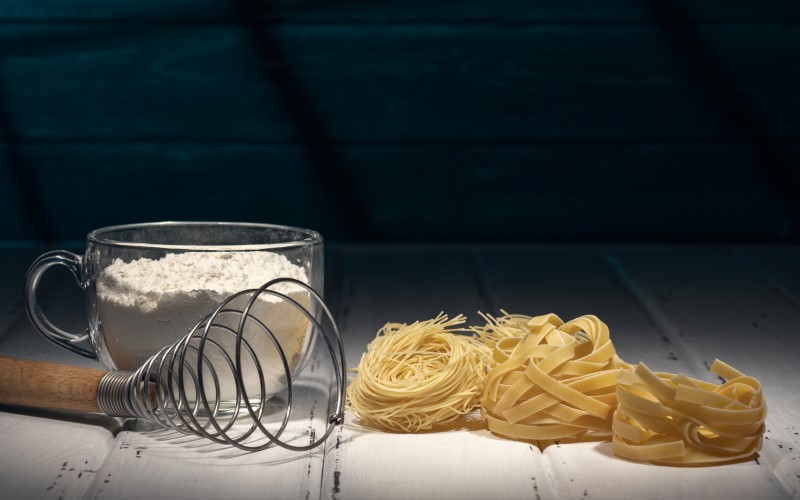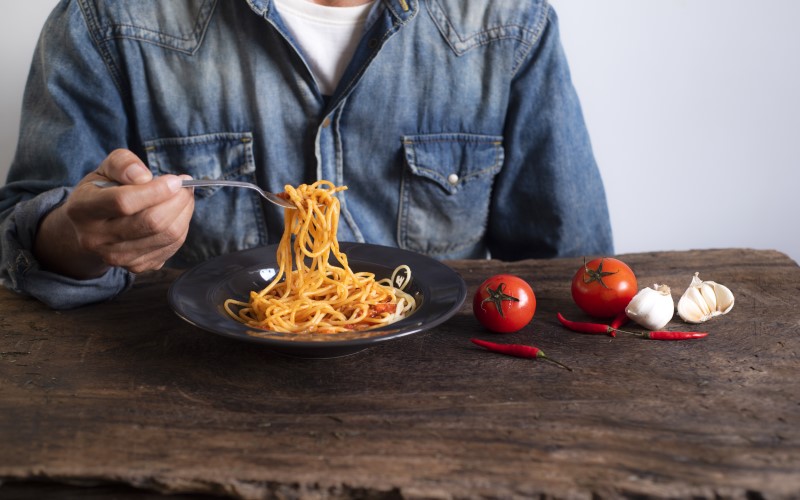Unraveling the Mysteries of Pasta Digestion: A Comprehensive Guide
Mar 13, 2024 By Nancy Miller
Ah, pasta a culinary delight cherished in households worldwide. From the classic spaghetti to the elegant penne and whimsical fusilli, there's an undeniable comfort in indulging in a plate of pasta adorned with a luscious sauce. But amidst our enjoyment, have we paused to contemplate the fate of this beloved carb once it ventures into our bodies?
How does our digestive system unravel its complexities and extract its nourishment? Join us as we explore the intricacies of pasta digestion, uncovering the mysteries of how long it takes for our bodies to process and assimilate its nutrients.
Understanding the Digestive Process:
Digestion begins in the mouth, where saliva enzymes break down carbohydrates in pasta. Chewed pasta forms a bolus, which travels down the esophagus to the stomach. In the stomach, gastric juices with hydrochloric acid and pepsin further break down pasta into chyme.
Then, in the small intestine, pancreatic enzymes and bile continue breaking down nutrients, with villi increasing absorption surface. Nutrients are absorbed into the bloodstream, providing energy and supporting bodily functions. Undigested particles, including pasta fiber, pass into the large intestine, where bacteria may further break them down before expulsion as waste.
Factors Affecting Pasta Digestion:
Various factors influence the process of pasta digestion, each playing a significant role in determining how efficiently and effectively your body breaks down and absorbs nutrients from this beloved carbohydrate-rich food.
Type of Pasta:
The composition of the pasta itself is a crucial factor in digestion. Whole wheat pasta, for instance, contains more fiber than its refined counterpart. Fiber takes longer to digest, slowing the overall digestion process and promoting a feeling of fullness for a more extended period. Conversely, delicate pasta made from white flour is lower in fiber and may be digested more quickly, leading to rapid spikes in blood sugar levels.
Cooking Method:
How pasta is cooked can also impact its digestion. Pasta-cooked al dente, meaning "to the tooth" in Italian, retains more of its natural texture and firmness. As a result, it takes longer for the digestive enzymes to break down the pasta into smaller particles, prolonging the digestion process. On the other hand, overcooked pasta becomes softer and more easily broken down, leading to quicker digestion and absorption of nutrients.

Individual Factors:
Each person's digestive system is unique and may respond differently to various types of pasta and cooking methods. Factors such as age, gender, metabolism, and overall health can influence the rate of digestion. Individuals with certain digestive disorders, such as irritable bowel syndrome (IBS) or gluten intolerance, may experience slower digestion or discomfort after consuming pasta.
Meal Composition:
How pasta is served and paired with other foods can affect digestion. Combining pasta with protein sources, such as lean meats or legumes, and fiber-rich vegetables can slow down digestion and promote a more gradual release of energy. Additionally, adding healthy fats, such as olive oil or avocado, to pasta dishes can enhance nutrient absorption and satiety.
How Long Does It Take to Digest Pasta?
Digestion initiates in the mouth, where enzymes in saliva start breaking down carbohydrates, the primary component of pasta. The pasta mixes with saliva as you chew, forming a bolus that travels down the esophagus and into the stomach.
Here, gastric juices containing hydrochloric acid and enzymes continue the breakdown process. The stomach's muscular contractions further churn the pasta, forming a semi-liquid chyme mixture.
Moving into the small intestine, the majority of nutrient absorption occurs. Pancreatic enzymes and bile further break down carbohydrates, fats, and proteins. The small intestine is lined with villi, small finger-like projections that enhance the surface area for absorption. This allows nutrients to be taken up into the bloodstream, supplying energy for diverse bodily functions.

The Timeframe of Pasta Digestion:
Typically, it takes approximately 6 to 8 hours for pasta to traverse the stomach and small intestine before reaching the large intestine. However, digestion may continue in the large intestine as fiber and other undigested components are broken down by bacteria. Listening to your body and noting how different pasta types and meal compositions affect your digestion can help optimize the process for overall digestive health.
Tips for Optimal Pasta Digestion:
If you're looking to optimize your pasta digestion and minimize discomfort, consider the following tips:
Choose Whole Wheat Pasta: Opt for whole wheat or whole grain pasta, as they contain more fiber and nutrients than refined pasta. Fiber promotes healthy digestion and helps regulate bowel movements, preventing constipation.
Cook Pasta Al Dente: Cooking pasta to al dente maintains its original texture and retards digestion. Conversely, overcooked pasta, while easier to digest, can rapidly increase blood sugar levels, contributing to energy dips and cravings.
Pair with Protein and Vegetables: Add a healthy quantity of veggies and lean protein sources, such as grilled chicken or tofu, to your pasta dish to achieve balance. This blend offers a variety of essential nutrients and fiber, supporting feelings of fullness and maintaining steady blood sugar levels.
Stay Hydrated: Drink plenty of water throughout the day to support digestion and prevent constipation. Water helps soften stool and move it through the digestive tract more efficiently, aiding in the digestion of pasta and other foods.
Conclusion:
The digestion of pasta is a remarkable orchestration involving a symphony of organs and enzymes working in tandem within the body. Although the precise duration of pasta digestion fluctuates, mindful consideration of variables such as the type of pasta, cooking techniques, and meal accompaniments can enhance digestion and bolster digestive well-being.
So, indulge in that savory plate of pasta with gusto, relishing the flavors while marveling at the intricate voyage it embarks upon through your digestive tract. By embracing these nuances, you satisfy your taste buds and nurture your body's complex digestive mechanisms for optimal health and vitality.








